
Related
Topics
Guests
- Ricardo Alarconformer foreign minister of Cuba and past president of the Cuban National Assembly.
- René Gonzálezformer Cuban intelligence agent and freed member of the Cuban Five.
Jailed in the U.S. for conspiracy to commit espionage, the Cuban intelligence agents known as the Cuban Five say they were in fact monitoring violent right-wing Cuban exile groups, not spying on the United States. Ricardo Alarcón, Cuba’s former foreign minister and, up until earlier this year, president of the Cuban National Assembly, has been one of the Cuban Five’s most vocal supporters. Alarcón joins us from Havana to discuss the meetings between Cuban authorities and the FBI in Cuba and the threat posed by militant exiles. “If President Obama is really interested in [projecting] a more positive image of U.S. policy abroad, if he is interested in improving relations with Latin America, he better listen to what many governments in Latin America have been telling him: Simply, free the five,” Alarcón says.
Transcript
AMY GOODMAN: “El Dulce Abismo,” “The Sweet Abyss,” performed by Cuban singer Silvio Rodríguez during a concert in honor of the Cuban Five at Havana’s Karl Marx Theater in September. This is Democracy Now!, democracynow.org, The War and Peace Report, with a Democracy Now! exclusive.
One of the most vocal supporters of the Cuban Five has been Ricardo Alarcón. Up until, well, earlier this year, he was the president of the Cuban National Assembly. He is also Cuba’s former foreign minister. He joined René González in the interview I did with him via Democracy Now! video stream in Havana. I asked Ricardo Alarcón to talk about meetings Cuban authorities had with the FBI in Havana to talk about the threat posed by the militant Cuban exile groups here in the United States.
RICARDO ALARCÓN: Well, there were several meetings, in fact. René was referring specifically to one that took place in Havana in July 1998, after some private exchanges between the two countries, the two governments, including President Clinton and a very well-known writer, García Márquez, who served as a go-between between us and them. They came down here, and they got a lot of information—recordings, videos, details of terrorist plots, and the addresses, the phone numbers, everything—so much that at the end of the meeting, the FBI officials thanked Cuba and said that they will need some time to process, though, that information, and they will go back to us. They never went back to us. They did act against the five, clearly to help to protect the terrorists. That is the substance of this process, of this trial.
AMY GOODMAN: Ricardo Alarcón, so the information that you, the Cuban government, gave to the FBI in 1998, they used that to track down René González and the other members of the Cuban Five?
RICARDO ALARCÓN: No. No, I don’t think so. What happened is this. According to the indictment, the FBI, they knew already the activities of the five, what they were doing. And that is a very interesting point. They knew what they were doing, and they didn’t act against them—for a very simple reason: What they were doing was nothing against the interests, the real interests, of the United States. They were not threatening their security. They were not posing any harm or any damage to your people and your society. What happened is that when they got that information, remember that the guy, when he said—before saying goodbye in Havana in July 1988, told us that they will need some time to process that information. I am sure that the very first thing that they did was to get in touch, in contact with a local FBI in Miami to check that information, to process the thing. And when they knew that, they tried—they tried to act against the five to divert the attention, to stop the possible cooperation between the two governments, and that was the beginning of this story. The person, the FBI agent or officer in Miami at that time, had been publicly recognizing that it was for him a very difficult task to persuade their chief to act against the five, probably because some people in Washington remember that they were talking to the Cubans precisely around those terror facts. There is an excellent book that was recently published in Canada by Professor Stephen Kimber, What Lies Across the Water, which had a very well-documented description of those days and what happened. And I think that it’s very useful in answering that question that you asked me.
AMY GOODMAN: Cuba also handed over videotapes and audiotapes that were tapes of Luis Posada Carriles talking about his terror campaign, as well as tapes of his accomplices. You gave that to the FBI as part of your proof that this kind of campaign was being targeted against Cuba?
RICARDO ALARCÓN: Yes. And more than that, in those very days, the 12 and the 13 of July, 1998, on the front page of The New York Times, Luis Posada Carriles appeared, interviewed by some, well, U.S. journalist, and there, he did recognize spontaneously. He said that he was responsible for every terrorist act taking place in Havana in those days. More than that, he said who was paying him for that. And he referred to the National—Cuban American National Foundation and Mr. Mas Canosa at that time. All that was front page in The New York Times.
AMY GOODMAN: What request do you have of President Obama, Ricardo Alarcón?
RICARDO ALARCÓN: I think that it’s very simple. The case can be solved very easily, simply with a stroke of his pen ordering the release of the four brothers that continue to be in prison. He can do that. He knows that perfectly well. He had—it’s not so difficult, Amy. They have been 15 years in prison. Against them, apart from minor violations of papers, whatever, there are two main charges. Conspiracy to commit espionage, which according to the court of appeals in Atlanta unanimously was wrong, was unconstitutional, was unlawful, the sentence imposed against three of the five on that count—that’s why they ordered a resentencing. And that’s why Antonio and Ramón got out of the maximum security prisons and are now at a lower-level prison and without a life term. The other count, conspiracy, again, to commit murder. The president, Obama, only needs to look at what the U.S. attorney general office wrote in May 2001 recognizing that that was impossible to demonstrate that charge and asking for the modification of the indictment in order not to have that accusation, because they were going to lose. They have two arguments: a federal appeals court saying that there was no espionage and the U.S. attorney general office recognizing that they couldn’t prove the other allegation, the other supposed crime. And those four individuals have been in prison for 15 years, on two counts that the prosecutors, in one case, or a court of appeals, in the other, have recognized that were unfounded.
The only thing that can be done—that should be done, and the only suggestion that I would make to President Obama, is to do what for 200 years many presidents have done, time and again: to withdraw the accusation or to consider the ending the punishment, deciding simply to get those people out of jail, right now, unconditionally. Nothing will happen against him. He will not lose anything. He will gain a lot. If President Obama is really interested in projected a more positive image of U.S. policy abroad, if he is interested in improving relations with Latin America, he better listen to what many governments in Latin America have been telling him: Simply, free the five.
AMY GOODMAN: What message, René González, do you have—what message, René González, do you have for the American people and for the American government, particularly President Obama?
RENÉ GONZÁLEZ: I would start with the American people. I believe—I mean, I was born there. I have family there, good people, people who don’t—of course, they don’t have my political opinions, but they supported me all the way since I was arrested. They supported my wife. They supported my daughters. And they are good Americans, like a lot of Americans that I met. I met good people everywhere. I met good officers in jail, people who were professional, who were decent. I met good people who was in prison, but they weren’t bad people. And I would say to all those people, to the American people, that we have more in common than separates us, that we should live together as neighbors, relate to each other through the things that make us human beings, through the things that unite us as people, and that it’s been too long for the two countries to be separated by politics.
As to the U.S. government, to listen to a whole continent that is telling them to change their relations with Cuba, to sit down with the Cuban government and talk about everything. The Cuban government has said that again and again. And I believe it’s time the U.S. government, for Obama, if he wants to leave a legacy as a president in the continent, to sit down with Cuba, and a lot is going to change, both with Cuba and with Latin America.
AMY GOODMAN: I want to ask you about the legacy of the award-winning journalist, filmmaker, author, professor, Saul Landau. He died last month at the age of 77. Saul made more than 45 films, wrote 14 books, many about Cuba. His most recent film, Will the Real Terrorist Please Stand Up?, was an exposé on the U.S. support for violent anti-Castro militants. Saul appeared on Democracy Now! last year and said this.
SAUL LANDAU: I went to Cuba in 1960 when I was a student, because I was curious. I was curious to see how a guy who was so disobedient, Fidel Castro, and his other revolutionaries were going to last. I didn’t think they could, and I went out to—I went down to Cuba to check it out. And I met people my age who were running government ministries and sleeping three hours a night and using a lot more of their brains than I was using. And I was impressed by watching people making history. And I think, like many other people who went down there at the time, this place seemed really different, that they were going to make a different kind of a revolution, and it was going to have its impact. And I think it did have its impact on the world. But that’s how I got there in the first place. And pretty soon, I was working to stop the United States from invading Cuba, like a lot of people who had gone down there.
And the first—one of the first talks I gave was in New York City at Town Hall. And as I came out, a guy tried to cut me on the back with a razor, a Cuban exile. I guess he took freedom of speech more seriously than I did.
AMY GOODMAN: And that was Saul Landau. And, of course, his latest film, Will the Real Terrorist Please Stand Up?, about the Cuban Five. If you could each comment on the significance of Saul Landau’s work?
RENÉ GONZÁLEZ: Well, I will say that Landau, Saul Landau, is—he was among the best on the American people. He was honest. He was courageous. And I believe that we’re going to miss him a lot. We live—we live in a difficult world, difficult times, and I believe that we need a lot of Saul Landaus.
AMY GOODMAN: Ricardo Alarcón, if you could comment?
RICARDO ALARCÓN: Saul and I were very close friends since our student years, when he came first in the early '60s to Havana. And I learned to respect him and admire him. And I think that his approve demonstrated that—the quality of the virtues that exist in the American people of love and solidarity, and also how a human being can be honest in their intellectual work, which was what Saul did in his entire life, not just on Cuba. He made excellent coverage of the Cuban revolution, but also remember what he did concerning the Letelier assassination and facing the risks of those terrorists. By the way, the same guys who did many things against us in Miami were also those who assassinated Orlando Letelier, and in front of everybody in the courtroom, Mr. Novo Sampol, addressing to Saul, said, “You are next.” And nothing happened. Mr. Novo Sampol continues working on organizing terror acts and is still now the security chief of the Cuban American National Foundation. Saul Landau will always be the best example that you can—that we can—that it's possible to have a different relationship between the U.S. and the rest of the world, that it is in the best interest of the American people to not to pretend to be the policeman of the world, not to dominate others, but to live in accordance with the values that represent the best of America. And Saul was perhaps a super demonstration of that.
AMY GOODMAN: That was Ricardo Alarcón, who until earlier this year was president of the Cuban National Assembly. He joined René González. They were speaking from Havana, Cuba. You can go to our website to see my extended interview with the late filmmaker, Saul Landau. He died on September 9th of cancer. You can also see all of our coverage of the Cuban Five over the years.

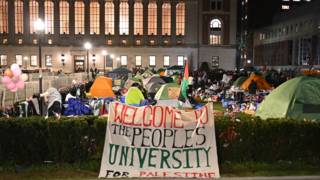
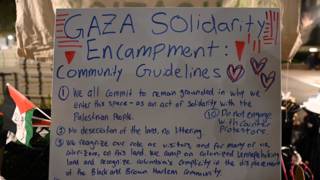
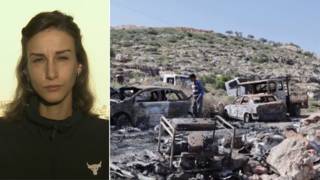
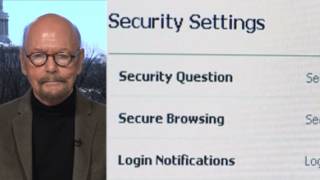





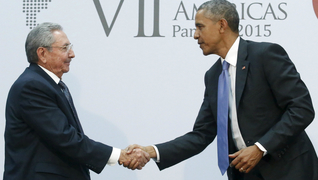

Media Options